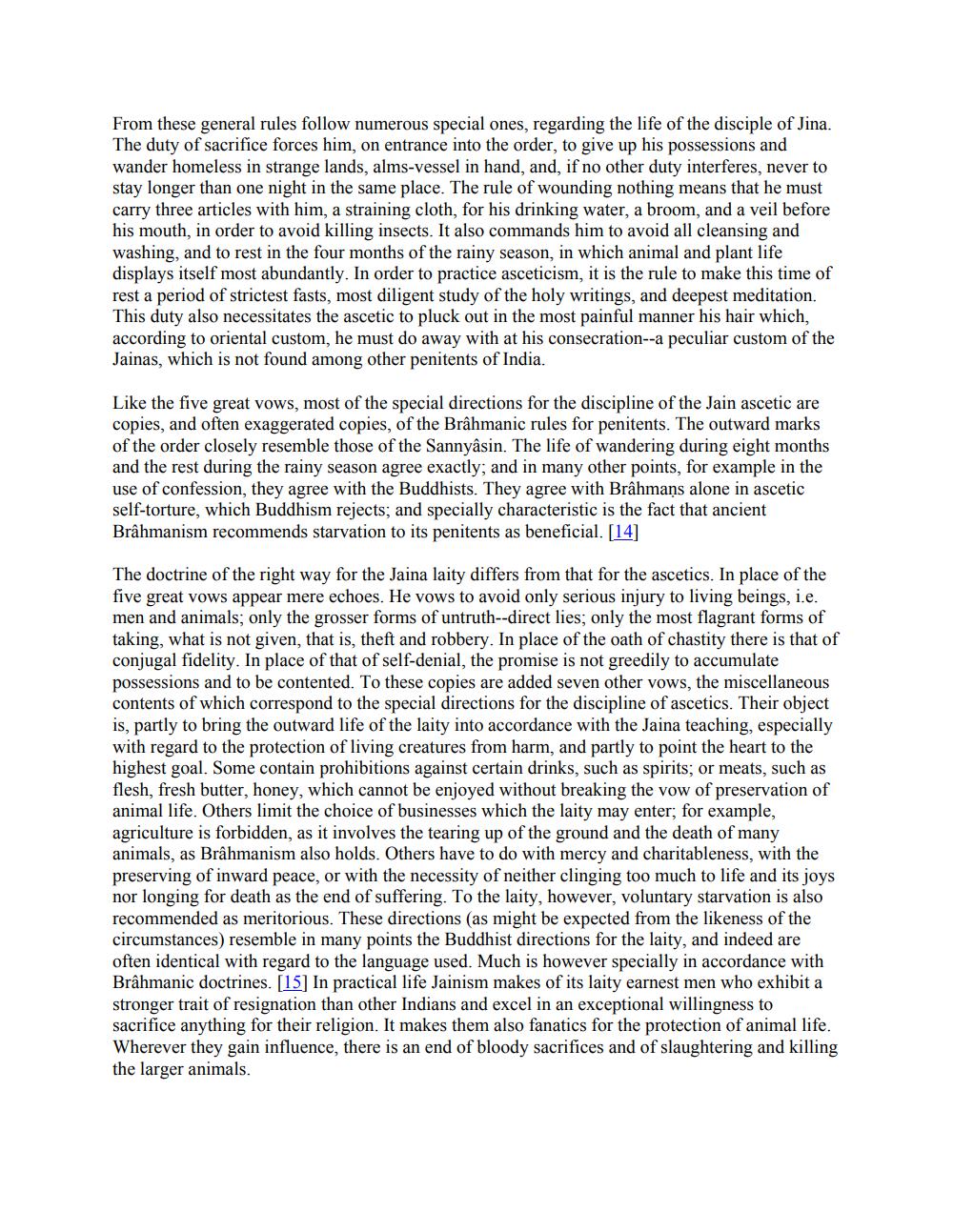________________
From these general rules follow numerous special ones, regarding the life of the disciple of Jina. The duty of sacrifice forces him, on entrance into the order, to give up his possessions and wander homeless in strange lands, alms-vessel in hand, and, if no other duty interferes, never to stay longer than one night in the same place. The rule of wounding nothing means that he must carry three articles with him, a straining cloth, for his drinking water, a broom, and a veil before his mouth, in order to avoid killing insects. It also commands him to avoid all cleansing and washing, and to rest in the four months of the rainy season, in which animal and plant life displays itself most abundantly. In order to practice asceticism, it is the rule to make this time of rest a period of strictest fasts, most diligent study of the holy writings, and deepest meditation. This duty also necessitates the ascetic to pluck out in the most painful manner his hair which, according to oriental custom, he must do away with at his consecration--a peculiar custom of the Jainas, which is not found among other penitents of India.
Like the five great vows, most of the special directions for the discipline of the Jain ascetic are copies, and often exaggerated copies, of the Brâhmanic rules for penitents. The outward marks of the order closely resemble those of the Sannyasin. The life of wandering during eight months and the rest during the rainy season agree exactly, and in many other points, for example in the use of confession, they agree with the Buddhists. They agree with Brâhmaņs alone in ascetic self-torture, which Buddhism rejects, and specially characteristic is the fact that ancient Brâhmanism recommends starvation to its penitents as beneficial. [14]
The doctrine of the right way for the Jaina laity differs from that for the ascetics. In place of the five great vows appear mere echoes. He vows to avoid only serious injury to living beings, i.e. men and animals, only the grosser forms of untruth--direct lies, only the most flagrant forms of taking, what is not given, that is, theft and robbery. In place of the oath of chastity there is that of conjugal fidelity. In place of that of self-denial, the promise is not greedily to accumulate possessions and to be contented. To these copies are added seven other vows, the miscellaneous contents of which correspond to the special directions for the discipline of ascetics. Their object is, partly to bring the outward life of the laity into accordance with the Jaina teaching, especially with regard to the protection of living creatures from harm, and partly to point the heart to the highest goal. Some contain prohibitions against certain drinks, such as spirits; or meats, such as flesh, fresh butter, honey, which cannot be enjoyed without breaking the vow of preservation of animal life. Others limit the choice of businesses which the laity may enter; for example, agriculture is forbidden, as it involves the tearing up of the ground and the death of many animals, as Brahmanism also holds. Others have to do with mercy and charitableness, with the preserving of inward peace, or with the necessity of neither clinging too much to life and its joys nor longing for death as the end of suffering. To the laity, however, voluntary starvation is also recommended as meritorious. These directions (as might be expected from the likeness of the circumstances) resemble in many points the Buddhist directions for the laity, and indeed are often identical with regard to the language used. Much is however specially in accordance with Brâhmanic doctrines. [15] In practical life Jainism makes of its laity earnest men who exhibit a stronger trait of resignation than other Indians and excel in an exceptional willingness to sacrifice anything for their religion. It makes them also fanatics for the protection of animal life. Wherever they gain influence, there is an end of bloody sacrifices and of slaughtering and killing the larger animals.




